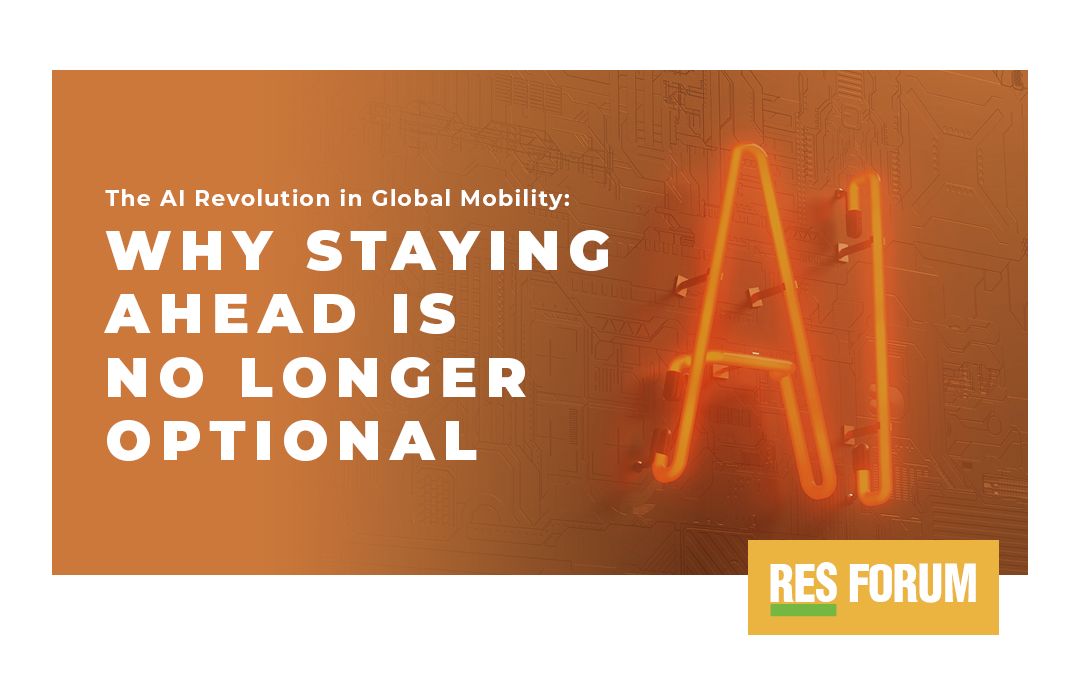Written by a European Head of Global Mobility in the technology sector
The world of work is in constant flux. Globalisation, evolving employee expectations, and the rapid pace of technological innovation are reshaping how organisations manage their international talent. At the forefront of this transformation is Generative Artificial Intelligence (GenAI), a technology poised to revolutionise global mobility from a complex, administrative burden into a streamlined, strategic advantage. For HR and global mobility professionals, keeping abreast of these changes isn't just about efficiency; it's about maintaining relevance in an increasingly AI-driven landscape.
Global mobility, by its very nature, is a labyrinth of legal, tax, immigration, and logistical complexities. Managing international assignments, remote workers and cross-border projects has traditionally been a labour-intensive process, fraught with manual tasks, fragmented data, and the ever-present risk of non-compliance. Enter GenAI, offering a new paradigm that promises to simplify these intricacies and unlock unprecedented strategic value.
GenAI's transformative power: from burden to breakthrough
At its core, GenAI excels at automation and efficiency. Imagine the sheer volume of repetitive, administrative tasks involved in a single international assignment: drafting assignment letters, processing visa applications, tracking expenses, preparing tax documentation, and generating compliance reports. GenAI-powered tools are already automating these high-volume, low-impact tasks, dramatically reducing processing times and freeing up global mobility teams. This shift allows professionals to move away from mundane data entry and towards more strategic, high-value activities, such as policy development, risk mitigation, and talent advisory.
Beyond mere automation, GenAI has the potential to significantly enhance the employee experience – a critical factor in successful assignments and talent retention.
Imagine a future where AI-powered chatbots and virtual assistants offer 24/7 support, providing instant answers to queries about housing options, local amenities, cultural nuances, or even complex tax policies. With the right build, they will very shortly be able to offer personalised recommendations, tailor information based on individual assignee preferences, and proactively flag potential challenges, creating a seamless and empathetic relocation journey. For employees navigating the complexities of a new country, this level of instant, 24/7/365, personalised support can be a game-changer, fostering a sense of control and reducing relocation stress.
From a strategic perspective, GenAI has the potential to empower global mobility with unparalleled data-driven decision-making capabilities. By analysing vast datasets, GenAI can forecast market trends, predict housing prices and living costs in specific regions, and anticipate potential delays in visa processing. This predictive analytics capability allows organisations to optimise cost forecasting, identify regional risks long before they materialise, and tailor relocation strategies to individual employees, ensuring better matches between talent and opportunity. The ability to extract meaningful insights from diverse data sources, such as visa processing times, vendor performance, and immigration pathways, allows for continuous process optimisation and more effective talent deployment.
Furthermore, GenAI could play a crucial role in bolstering compliance and risk management. With constantly evolving immigration laws, tax regulations, and local labour laws across multiple jurisdictions, staying compliant is a monumental challenge. AI systems can continuously monitor these changes, flagging potential risks and providing real-time alerts. This proactive approach helps organisations avoid costly fines and reputational damage associated with non-compliance, particularly in areas like permanent establishment risk or worker misclassification.
Why staying relevant is crucial: the imperative to adapt
The emergence of GenAI underscores an undeniable truth for global mobility professionals: continuous learning and adaptation are no longer optional, but essential for survival and growth. The global mobility landscape is not static; it's a dynamic ecosystem shaped by geopolitical shifts, new demographic realities, and the persistent rise of flexible work models like "workations" and hybrid arrangements.
Historically, global mobility functions were primarily operational units, focused on logistical execution. However, with the administrative burden increasingly offloaded to AI, the function is rapidly evolving into a strategic advisor role. Global mobility professionals are now expected to contribute to broader organisational strategies, influencing decisions around talent allocation, business expansion, and even ESG compliance. Those who fail to develop their technological fluency and strategic acumen risk being left behind, unable to contribute at this higher level.
Companies that invest in and effectively leverage AI technologies are gaining a significant competitive edge in attracting, deploying, and retaining global talent. They can respond with greater agility to market demands, optimise their talent management processes, and deliver a superior employee experience. In an era where talent is a key differentiator, being at the forefront of technological adoption directly impacts an organisation's ability to compete.
Moreover, the expectations of the modern workforce, particularly Gen Z, are shaping the demand for AI-powered solutions. Younger generations entering the workforce are digital natives who expect seamless, tech-enabled processes. They anticipate AI tools that streamline logistics, provide instant information, and enhance their overall experience when undertaking international assignments or remote work. Global mobility functions that fail to meet these technological expectations risk alienating a significant portion of the talent pool.
While the benefits are clear, it's also important to acknowledge the challenges inherent in AI adoption, such as ensuring data quality, integrating new systems with legacy infrastructure, addressing ethical considerations, and managing potential employee resistance. The "human in the loop" remains critical; GenAI is a powerful augmentative tool, not a replacement for human judgment, empathy, and strategic insight.
In conclusion, GenAI is not just another technological trend; it's a fundamental shift that is redefining the future of global mobility. For HR and global mobility professionals, embracing this revolution is imperative. By actively engaging with GenAI, understanding its capabilities, and adapting their skill sets, they can move beyond transactional tasks to become invaluable strategic partners, ensuring their relevance and driving the success of their organisations in the new era of global work. The time to adapt is now; the future of global mobility depends on it.

